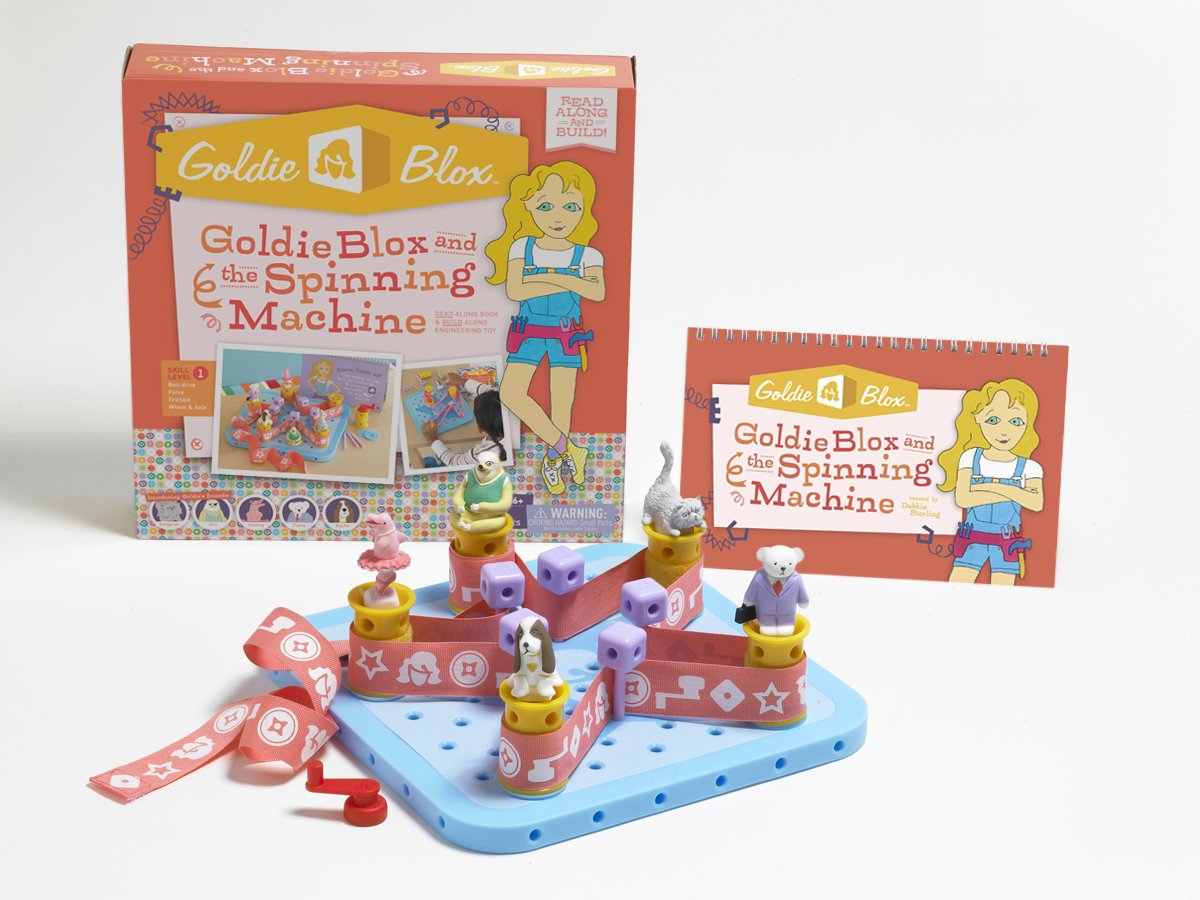Student voice is good. We should take the needs, interests, concerns, talent, curiosity, discomfort, and joy of children seriously. (pretty courageous statement, eh?)
However, if one is truly committed to making the world better for kids, “voice,” is nice, but inadequate. “Voice” absent of power is often little more than propaganda or exploitation.
While I’ve been on a brief social media “skunk at the garden party” hiatus, Dean Shareski has generously filled-in by sharing his queasiness over the “viral” Goldieblox video being passed around the Web. Señor Shareski set his BS detector on high and has provided evidence that the “amazing” Rube Goldberg machine “made by girls” is merely a commercial for a new toy called, Goldieblox.
I am shocked! Shocked!
Anyone who knows me knows that I love toys. I find buying them irresistible. I’ve been seeing Goldieblox at Maker Faires for more than a year, but have not bought a set because I think they lack extended play value (a term LEGO uses internally). I’m not one to get all outraged that a toy for girls is pink. Goldieblox just hasn’t seemed very interesting to me or the girls I work with. It’s not part of my workshop road show sweeping the globe, “Invent To Learn.”
It just doesn’t seem that Goldieblox has any chance of measuring up to the self-promotion and hype of its creator that her box of ribbon and spools is “building women engineers.” I applaud the sentiment, but if we are truly serious about improving the education of girls, it will take a lot more work than a trip to Toys R Us.
I could be wrong. I’ve recently been upgrading my initial assessment of littleBits, based on my observations of children playing with the new toy/electronics construction kit. So, perhaps I will soon fall in love with Goldieblox, but I doubt it.
Back to Monsignor Shareski…
In his post critical of the Goldidblox video, Fake and Real Student Voice, Professori Shareski awakened several repressed social media memories I had long forgotten.
I took a lot of “brown porridge” when I called BS on the very same videos of yesteryear.
There was Dalton Sherman, the “amazing” 5th grader who was coached all summer-long to give a condescending speech, written by the Dallas Schools PR department to Dallas teachers, right before laying off 400 of them. I smelled a rat the second I saw the video. Was called a big fat poo-poo head by teachers on social media and was right. BTW: Dalton Sherman seems to have disappeared just like those teacher jobs. So much for being the voice of school reform.
Then there was Michael Wesch (who is an important scholar) made famous by the hostage film he created in which college students decried the state of education.
Fantastic. A college class with far too many students in it (200) attempts to revolutionize the educational system by whining in a five minute web video.
I’m sorry, but count me unimpressed!
Perhaps a student should hold up a sign saying, “My professor is wasting my time and money by making me participate in a piece of exploitative propaganda in which I get to insult either my generation or the one before me just to get on YouTube.”
How did bashing our own profession become such a popular sport? What possible value could demeaning educators have in a professional development setting? Are we desperate for moving pictures or are they merely a substitute for actual ideas?
From Hey Mom! Look What I Made in College (November 2007)
Aside from their lack of authenticity, what these three AMAZING viral videos of is how children and claims of “student voice” exploit children for propaganda purposes. The Goldieblox video is a commercial selling a toy. We don’t tweet Sir Grapefellow commercials (my preferred boyhood breakfast treat) as AMAZING examples of student voice, so why the wishful thinking about Goldieblox?
Señor Shareski rightfully cites my colleague Super-Awesome Sylvia (read Super-Awesome Sylvia in the Not So Awesome Land of Schooling) as a counter example to the fake Goldieblox commercial. I have worked closely with Sylvia over the past couple of years and made her part of the Constructing Modern Knowledge faculty, not because she is cute (she is), but because she is accomplished. She knows stuff. She has skills. She has a great work ethic and is a terrific teacher (at 12).
However, talent and achievement did not made Sylvia immune from cynical exploitation by Rupert Murdoch and Joel Klein’s education cabal as documented in an article I wrote for the Huffington Post, Shameless Shape Shifters.
So the moral of our story is…
Three lessons…
- As a young blogger in 1971, The Brady Bunch taught me an important lesson relevant here, caveat emptor – buyer beware. Users of social media need to “follow the money,” have a highly-tuned BS Detector, and know when and what they are being sold.
- Calling everything amazing or everyone a genius is lazy and counterproductive.
- Student voice without what Seymour Papert calls “kid power” is worse than empty rhetoric, it is a lie. Escapism is not the same as freedom. Too much of what is offered as “student voice” offers a false sense of agency, power, or freedom to the powerless. It is what Martin Luther King, Jr. called, “the intoxicating drug of gradualism.”
Veteran educator Gary Stager, Ph.D. is the author of Twenty Things to Do with a Computer – Forward 50, co-author of Invent To Learn — Making, Tinkering, and Engineering in the Classroom, publisher at Constructing Modern Knowledge Press, and the founder of the Constructing Modern Knowledge summer institute. He led professional development in the world’s first 1:1 laptop schools thirty years ago and designed one of the oldest online graduate school programs. Gary is also the curator of The Seymour Papert archives at DailyPapert.com. Learn more about Gary here.



I’m amazed, I must say. Rarely do I encounter a blog that’s both educative and
interesting, and without a doubt, you’ve hit the
nail on the head. The problem is something not enough men and women are
speaking intelligently about. I’m very happy I found this during my search
for something regarding this.
The first comment here says it all.